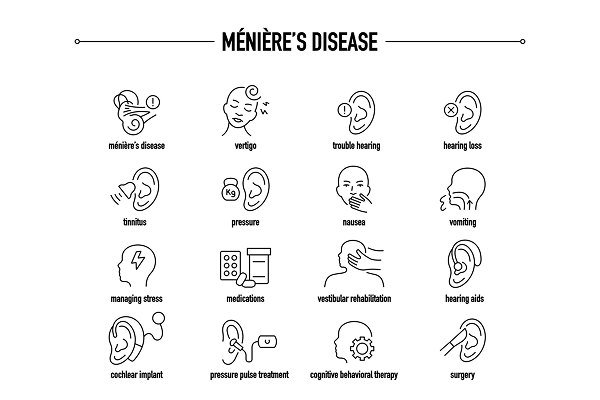
Have you ever sat motionless and felt as though the room was circling you? Or have you ever experienced a bothersome ringing in one ear that persists despite attempts to resolve it? These might indicate Meniere's Disease, a disorder that impacts the inner ear and therefore impairs hearing and balance.
Although Meniere's disease is not fatal, it can significantly impact your daily life. Even the most basic duties can be hampered by sudden episodes of vertigo, hearing loss, or chronic ringing in the ears. The good news is that professional care and an early diagnosis can have a significant impact.
Let's practically discuss and examine this disease in further detail and see how Manipal Hospital Baner's professional experts can help manage it.
Synopsis
Meniere's Disease: What is it?
Recurrent episodes of vertigo (spinning sensation), hearing loss, tinnitus (ear ringing), and ear pressure can all be symptoms of Meniere's Disease, an inner ear disorder.
It usually only affects one ear and manifests in people between the ages of 40 and 60, though it may occur at any age. These symptoms are brought on by an imbalance of blood in the inner ear, which affects the signals that are sent to the brain for hearing and balance.
Meniere's disease symptoms and indicators
Usually occurring abruptly, the symptoms can linger anywhere from 20 minutes to several hours. Between bouts, you may feel perfectly normal, which makes the illness unpredictable and upsetting.
Typical signs and symptoms include:
-
Vertigo: The feeling that you or your environment is spinning.
-
Tinnitus: Sounds in the ear that ring, buzz, or hiss.
-
Hearing loss might become permanent, but it usually fluctuates at first.
-
A sensation of fullness or pressure in the ear that is impacted.
-
Loss of equilibrium or instability.
It's essential to speak with our ENT specialist if you're having any of these symptoms. For a prompt assessment, you can schedule a professional consultation with our ENT physician at Manipal Hospital Baner.
Meniere's Disease: The Four Stages
It is easier to assess progress and adjust the treatment plan when the phases are understood.
1. The preliminary stage: tinnitus, mild hearing loss, and episodes of abrupt, unpredictable vertigo.
2. Middle Stage: Vertigo and hearing loss deteriorate, and tinnitus becomes more noticeable.
3. The Final Phase - Vertigo is replaced with progressive hearing loss and balance problems, though the latter may subside.
4. Burnout Stage: Vertigo stops, but hearing or balance issues may linger following irreparable damage.
Specialised diagnostic packages and ENT health screenings may be investigated to ascertain your existing condition and the best course of action.
What is Meniere's illness?
The disorder can be controlled with a combination of medication, lifestyle modifications, and occasionally surgery, even though there is presently no cure.
-
Drugs
-
Diuretics: Help get rid of excess fluid.
-
Betahistine: Reduces the occurrence and intensity.
-
Antiemetic drugs: To stop motion sickness while it's happening.
Disclaimer: Please visit an ENT professional before taking these medications.
Modifications to Nutrition
-
A diet low in salt aids in the body's reduction of fluid retention.
-
Avoid smoking, drinking, and caffeine.
-
Maintain a regular sleep pattern and drink lots of water.
Assistance for Hearing
Tinnitus maskers and hearing aids are examples of hearing assistance devices that assist those who have hearing loss or constant ringing. You can consult audiology experts for options tailored to your needs.
Methods of ENT
ENT experts may suggest injections, grommet insertions, or inner ear surgeries in severe cases. You can learn more about these options at the ENT surgeries section.
How to Deal with Meniere's in Daily Life
-
Patients and medical professionals have offered the following useful recommendations:
-
During an episode, you can either sit or lie down until the spinning stops.
-
Avoid sudden movements and strong lighting, as these could make you feel lightheaded.
-
To help you manage your tinnitus before bed, use white noise generators.
-
Keep a symptom journal to keep an eye out for trends and triggers.
-
Join a support group or see a counsellor if your anxiety becomes too much for you.
-
With the right care and a few lifestyle adjustments, many Meniere's disease patients go on to lead long, healthy lives.

What Makes Manipal Hospital Baner the Best Option?
With decades of experience treating Meniere's disease and other complex ear diseases, Manipal Hospital Baner is one of Pune's most respected ENT departments.
Patients trust us for ENT care for the reasons listed below:
Experts in ENT and audiology
Advanced diagnostic techniques, including audiometry and balance tests, are customised treatment options.
-
The availability of both surgical and non-surgical techniques
-
Easy transition from consulting to receiving follow-up care
-
The hospital offers us specialised ENT health packages and childcare services for our convenience.
In charge of the spinning and ringing.
Conclusion
If you or someone you know is experiencing Meniere's disease symptoms, act quickly. The sooner you seek medical counsel, the higher your chances of success. Book an appointment now!
FAQ's
Common symptoms include vertigo, tinnitus, a feeling of fullness in one ear, and fluctuating hearing loss.
There’s no permanent cure, but with early treatment, symptoms can be managed effectively.
Through a combination of hearing tests, balance assessments, and patient history.
Symptoms, especially vertigo, tend to come in episodes, while hearing issues may become more persistent over time.
Not always. Surgery is considered when lifestyle changes and medications are no longer effective.






















 5 Min Read
5 Min Read

















